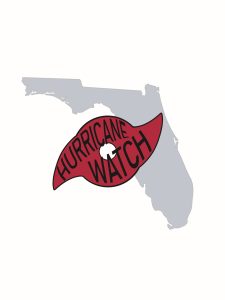 Hurricane Ian ripped through Southwest Florida and other parts of the East Coast last week leaving thousands without power while damages piled up. Many students from Florida felt helpless as their families back home braced for the storm and what lay ahead.
Hurricane Ian ripped through Southwest Florida and other parts of the East Coast last week leaving thousands without power while damages piled up. Many students from Florida felt helpless as their families back home braced for the storm and what lay ahead.
Sophomore business major Taylor Martin was born and raised in Labelle, Fla., 30 minutes away from the epicenter of the storm’s damage in Fort Myers. Her family did not have the opportunity to evacuate.
“My sister is a registered nurse, so she had to stay because she was on call to go to the hospital. My dad works with land/public safety, so he had to stay to help others. My mom decided not to evacuate so she could watch my nephew and keep things as comfortable as possible at home for my sister and dad,” Martin said.
Martin’s family was one of the thousands who suffered property damage.
“Our pool screens and entire cage were blown out, along with many fallen trees and branches in our yard,” she said.
Four days after the storm, her family still had no cell service or electricity.
Hers was not the only family who stayed at home to brave the elements. Kirker Watkins, a junior allied health studies major from Orlando, noted her family was in a similar situation.
“My family did not evacuate, but they did prepare by moving all outdoor furniture and moving cars. We had sandbags and plenty of food/water. My family also had a back-up generator to help with power if it went out,” Watkins said. “Our town is completely flooded and roads are ruined. They are just now getting power back, but most schools are still shut down. The neighborhood I live in was completely flooded and our street’s brick was ripped up.”
Watkins expressed how hard it was to be away at school and watching from afar while the storm tore through their state.
“It was really hard to be here in Oxford while my entire family was going through this. All my family and friends are either still in Orlando or go to school somewhere in Florida,” Watkins said.
Martin also expressed how difficult it was not being in Florida.
“It has shattered my heart into pieces to see surrounding cities and counties that I love so much be completely leveled. It has honestly taken a toll on my school life because it is all I think about while sitting in class. I would give anything to go home to my family and friends and help out the thousands of less fortunate,” Martin said.
When Hurricane Ian made landfall in Florida, winds were upwards of 155 miles per hour, coming in as a category 4 storm. Although the eye of the storm hit Southwest Florida, the eastern coast of Florida prepared for the worst.
Sarah Caroline Crall, a Palm Beach resident, said her family experienced some bad weather as a result of Hurricane Ian.
“In Palm Beach, there were high surf advisories, strong winds and even a few tornadoes that touched down in my area, which was scary, but my home was okay,” Crall said.
Although Florida residents are not strangers to hurricanes, Hurricane Ian brought a record amount of flooding. The flooding, exacerbated by a lack of preparation, led to damages that could total up to $47 billion dollars, according to CoreLogic, an analytics company.
“Our hurricanes usually are overly prepared for, and we expect more than we usually get, but this one seemed to have us thinking it wouldn’t be horrible when in reality it was one of the worst we have ever had,” Martin said.
The rebuilding process has already begun for many towns and cities that were hit by Hurricane Ian, but there is a level of uncertainty.
“I honestly have no clue what the future holds for Southwest Florida,” Martin said. “Fort Myers, Sanibel, Port Charlotte, among others, are completely wiped out. These cities provide hundreds of jobs and millions of dollars to Florida tourism. The economy will take years to recover.”
Crall added that the recovery from Hurricane Ian will be different from many other previous storms.
“This storm was absolutely brutal — at almost a category 5 storm with 155 mile per hour winds, something’s obviously different about the sheer magnitude and power of this storm, and it will take a lot to come back from,” Crall said.
After seeing what has been lost, locals are starting to prepare for future storms.
“My family along with many others in southwest Florida will prepare in the future by evacuating way sooner than what the state advises,” Martin said. “Because this was such an unpredictable storm, people did not take it seriously until it was too late.”



























